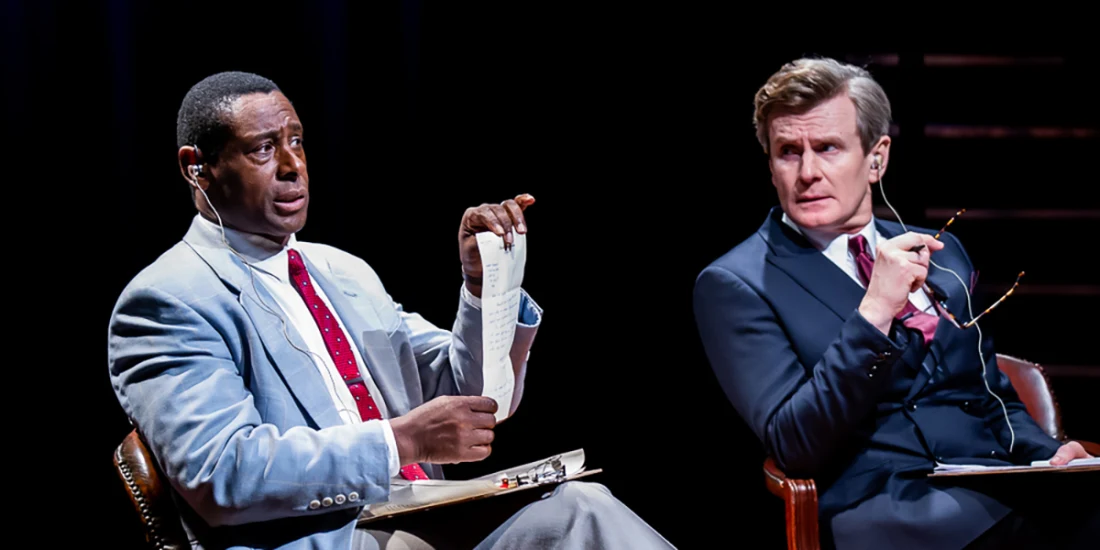'Best of Enemies' review — James Graham's political drama illuminates the power of personality
Could any political play top the current seething drama in Westminster? Perhaps not, but James Graham's latest is another fascinating slice of history that feels all too pertinent. In fact, our voting in a TV-friendly character as Prime Minister, only to rue the disastrous consequences, can partly be traced back to this key juncture when politics fully embraced entertainment and personality trumped all else.
Graham takes us back to 1960s America and a nation teetering on the brink of change. There are multiple assassinations, from Martin Luther King Jr. to Bobby Kennedy, and the 1968 Democratic Convention in Chicago in the build-up to the Presidential election sees violent clashes between protestors and the heavy-handed local police.
In the midst of this is the news president of ABC, who has rather less lofty concerns: namely, how his flagging TV network can catch up to its rivals. He decides to try "unconventional" coverage of the two conventions (we begin with the Republican one in Miami). Instead of just pointing a camera at the stage, or reporting the news straightforwardly, he brings in two opinionated intellectuals to debate issues - and, hopefully, juice the ratings with their conflict.
The oppositional pair are Gore Vidal, the debonair, liberal, bisexual playwright and author - the self-styled American Oscar Wilde - and William F Buckley, the Christian, conservative, family values-spouting thinker who founded the magazine National Review.
Graham caught a documentary about these debates and immediately saw the dramatic potential in their prize fights, but also argues that this was the dire moment when we switched from neutral journalism into rabid talking heads and, well, theatre. Our current culture wars rhetoric is writ large - the liberal elites, the right's claiming of patriotism, the shift from class difference to ideology - as is the format espoused by the likes of Fox News. However well-intentioned, this talk show birthed a monster.
In form, the play has elements of Graham's political history This House, his TV origin story Quiz, and, inescapably, Peter Morgan's Frost/Nixon, with the two sides building up to this recorded showdown - and us coming to understand the stakes for each. Both men want more influence and respect, and a dose of fame, and are pressured to "win" the battle. The personal and the political become entangled, just as they will be increasingly from this point onwards.
Jeremy Herrin's Headlong/Young Vic production nimbly fills out this world, with judicious use of archive clips (video by Luke Halls) to give context or to dramatise the backstory of characters like African-American activist James Baldwin, who previously debated Buckley at the Cambridge Union. In Bunny Christie's clever design, we sometimes see the debaters both in front of us and on big screens, demonstrating how TV reshapes our view, and there's also a glass-fronted production gallery above housing another audience.
Although there's a lot of information coming at us, Herrin's excellent multi-roling ensemble keeps us engaged with vivid characterisation and wry humour. Syrus Lowe is particularly strong as Baldwin, among others, as is Clare Foster as Buckley's shrewd wife, John Hodgkinson as the debate moderator Howard K Smith and a bullying Chicago mayor, and Kevin McMonagle as the ABC news chief and veteran anchorman Walter Cronkite. Tom Godwin also supplies a great Andy Warhol spoof.
But this is really a duel, and a fascinatingly cast one. It's no surprise that Charles Edwards nails the charming, waspish Vidal, while also demonstrating how much of his persona is perfomative, fuelled by neediness and ambition. More arresting is the phenomenal black actor David Harewood playing the racist Buckley. It's an inspired choice, taking a figure who most viewers (especially at this venue) would dismiss as intolerable and complicating our response to him through Harewood's profound portrait.
That's the whole point here, after all: that we should listen to those we disagree with rather than just cosying up in our echo chambers. Graham gives us the worst of this heated, cross-talking format, which descends into vicious slurs, and also the utopian version: two men sitting down to exchange ideas in good faith. It's telling that the latter works when the cameras are off. But Baldwin's criticism lingers, too: there's a big difference between arguing about ideas in abstract and fighting for your life. Even these two supposed outsiders are protected by their privilege. A thought-provoking and resonant drama.
Best of Enemies is at the Young Vic to 22 January.
Photo credit: David Harewood and Charles Edwards in Best of Enemies (Photo by Wasi Daniju)
Originally published on
